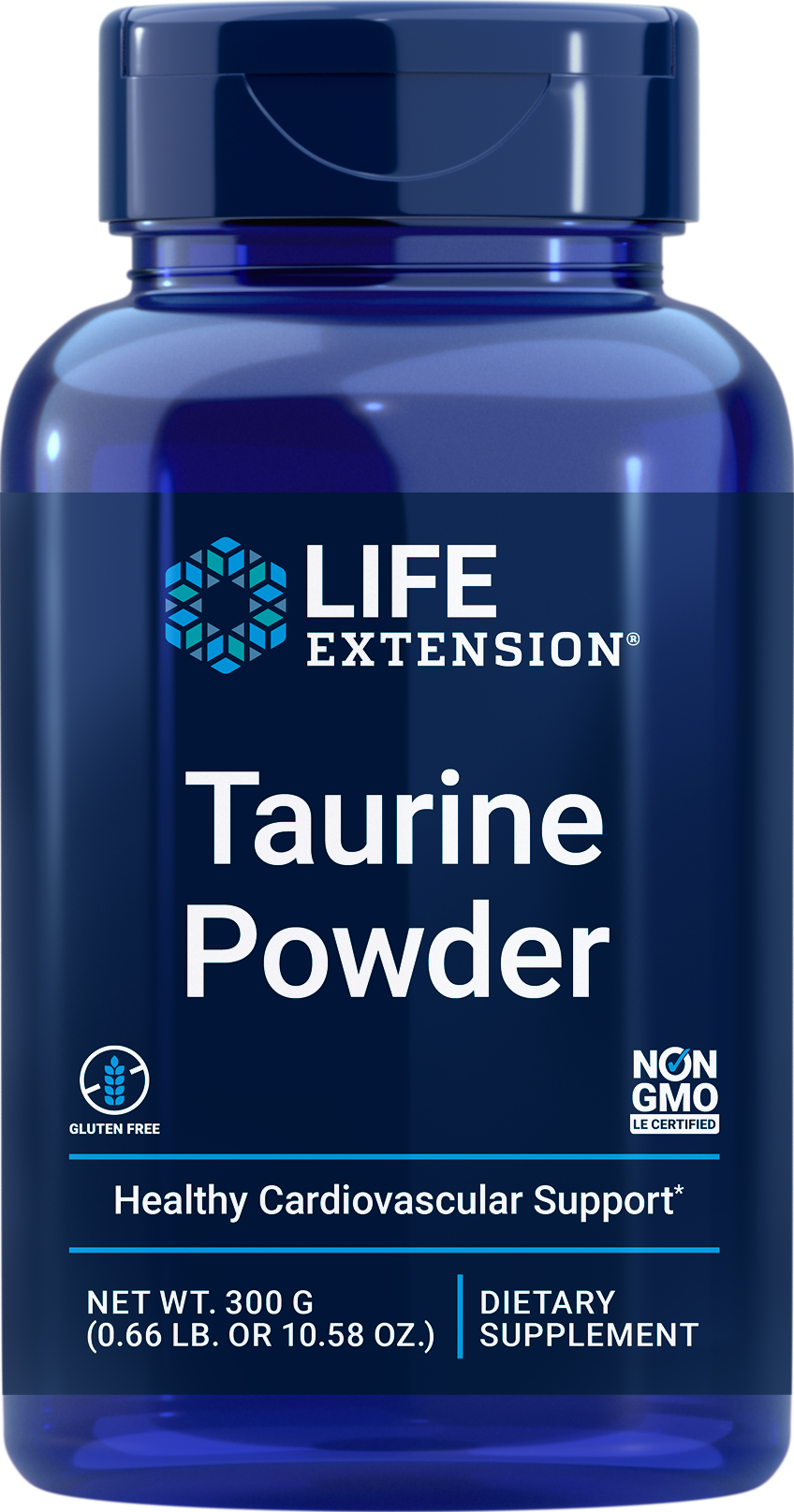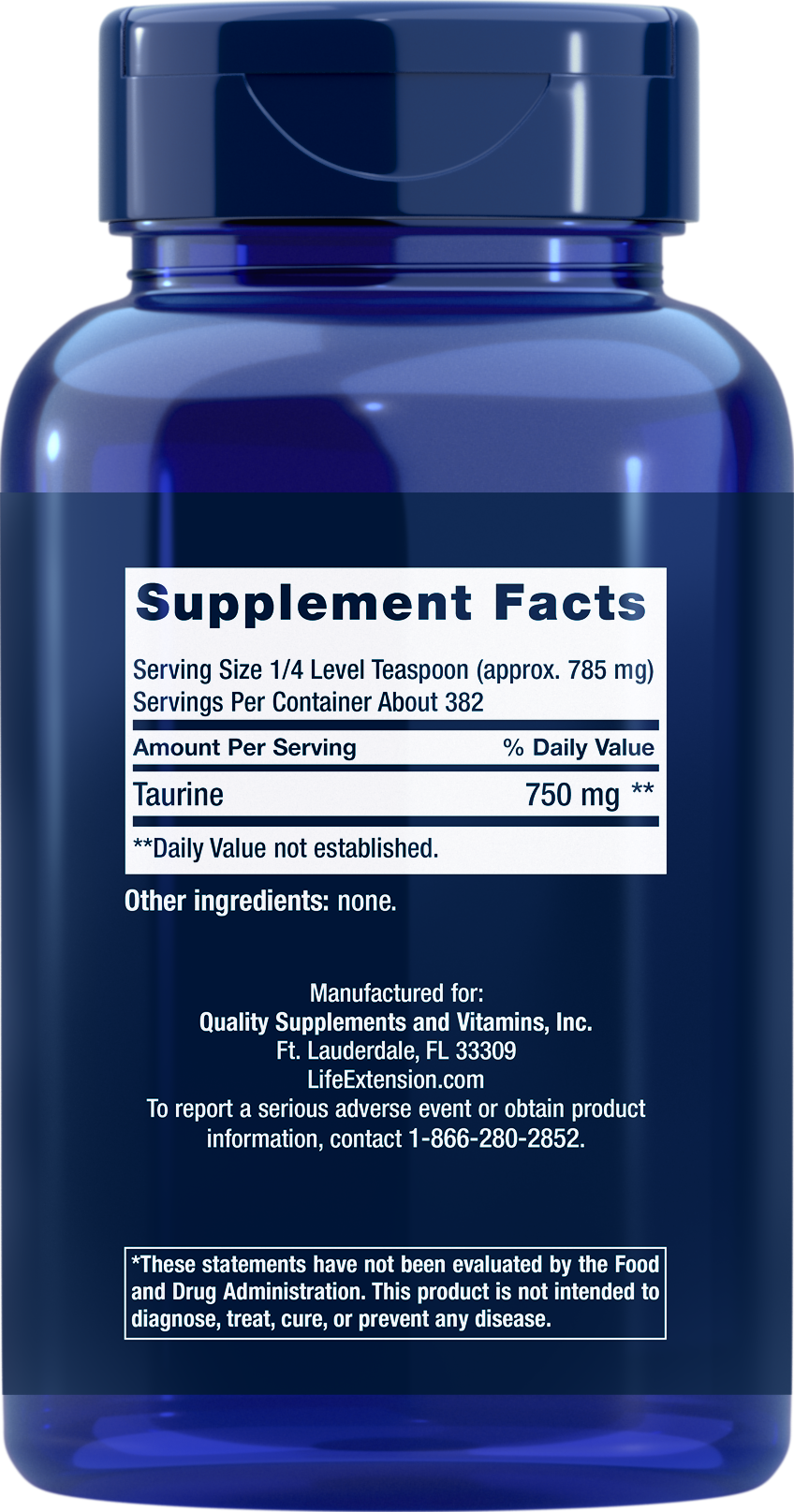Taurine Powder
Support for cardiovascular & muscle health
Taurine Powder
Support for cardiovascular & muscle health
For you, if you want to make sure your taurine intake is sufficient
The formula of Taurine Powder can:
- Support overall cardiovascular health
- Promote healthy nervous system function
- Support skeletal muscle health
- Encourage optimal exercise performance
The amino acid taurine is known for supporting heart health. But taurine has a range of health benefits, from promoting cell membrane stability to encouraging healthy nervous system function. Taurine may also help maintain already healthy blood pressure and blood glucose levels, promote muscle recovery after exercise, and more.

on orders over € 69
We have a 100 days return policy, not the standard 30 days!
Order before 11:00 CET, for same day shipping (Mon-Fri)
We can help you in 6 languages
Taurine is one of the body’s most abundant free amino acids amino acid. It's found in big quantities within your body, especially in the central nervous system, where it appears to play a regulating role.
However, taurine lacks in many diets and, in case of illness, may not be sufficiently produced by your body.
Taurine can support water and calcium movement across cell membranes, which helps maintain cell membrane stability. It can also encourage bile salt production in the liver.
Taurine can promote heart health
Studies suggest that taurine promotes cardiovascular health in a variety of ways. It can help maintain already healthy blood pressure, heart rhythm, and vascular function and encourages healthy heart muscle contractions.
Dietary taurine can also help promote normal insulin response and support already healthy blood glucose levels.
Nervous system health and taurine
Taurine is especially concentrated in the excitable tissues of the central nervous system.
It plays an important neuroprotective role, in part through its ability to maintain water and electrolyte balance across cell membranes, inhibit oxidative processes and promote a healthy inflammatory response.
Taurine also helps promote healthy cognitive function and retinal health.
Muscle health and taurine
Taurine may support skeletal muscle health and has been shown to support exercise performance and help maintain muscle mass and function as we age. Evidence indicates that taurine supports healthy aging and promotes longevity.
According to published research, taurine has been shown to:
- Support insulin response and healthy glucose metabolism
- Help maintain intracellular electrolytes balance (particularly calcium)
- Support eye health
- Help maintain central nervous system health
- Encourage cell membrane stability & water balance (osmoregulation)
- Promote healthy bile salt formation
- Help maintain cognitive function and neuron integrity
- Encourage heart health and function
A daily serving of 1/4 level teaspoon mixed in juice or water can support optimal cardiovascular health and beyond.
Serving size: 1/4 level teaspoon (approx. 785 mg)
Servings per container: about 382
| Amount per serving: | % RI | |
| Taurin | 750 mg | * |
RI = EU Reference Intake, * no RI available.
Ingredients:
L-Taurine.
Non-GMO
Dosage and use:
Mix 1/4 level teaspoon daily in water or juice, or as recommended by a healthcare practitioner.
Warnings:
- KEEP OUT OF REACH OF CHILDREN.
- DO NOT EXCEED RECOMMENDED DOSE.
- Do not purchase if outer seal is broken or damaged.
- If you are undergoing treatment for a medical condition or if you are pregnant or lactating, please consult with your medical practitioner first.
- A food supplement should not be used as a substitute for a varied and balanced diet and a healthy lifestyle. Store tightly closed in a cool and dry place.
- Curr Protein Pept Sci. 2018;19(7):673-680.
- Redox Biol. 2019;24:101223.
- Biomol Ther (Seoul). 2018;26(3):225-241.
- Adv Pharmacol. 2015;74:263-302.
- Food Funct. 2016;7(4):1849-63.
- Amino Acids. 2014;46(1):111-9.
- Curr Hypertens Rep. 2018;20(9):81.
- Amino Acids. 2018;50(5):487-502.
- Life Sci. 2019:116584.
- Clin Exp Optom. 2013;96(3):310-32.
- Sports Med. 2018;48(5):1247-1253.
- Proc Natl Acad Sci U S A. 2018;115(43):10836-10844.
- J Biomed Sci. 2010;17 Suppl 1:S6.
- PLoS One. 2014;9(9):e107409.



